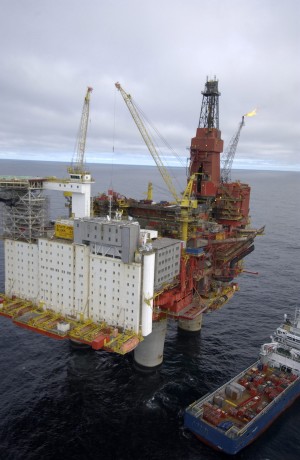Instead of simply stashing away Norway’s oil revenues in an overseas investment fund for future generations, calls are rising for more investment of the money in Norway itself. With trains, roads and other major infrastructure badly in need of major investment, one top politician is challenging his own government to loosen the pursestrings.

Per Olaf Lundteigen of the small Center Party (Senterpartiet, Sp) criticized his own bosses on the front page of newspaper Dagens Næringsliv (DN) on Wednesday. The Center Party is one of the three making up Norway’s left-center coalition government, which is trying to rein in spending and cut back on use of oil revenues.
Now Lundteigen, a Member of Parliament who also is finance policy spokesman for his party, is publicly challenging his own government’s restrictive line. With oil revenues from the North Sea continuing to pump up the Norwegian treasury, thanks to still-high oil prices, Lundteigen raises a simple question: “Why not build up the country when we have the chance?”
The government and many economists claim Norway shouldn’t use more than 4 percent of the country’s so-called “Oil Fund” profits, because spending more than that can boost inflation and interest rates. Last year, the government allowed more spending, but only to counter any ill effects of the global finance crisis.
Now Finance Minister Sigbjørn Johnsen of the dominant Labour Party has warned repeatedly that Norway must roll back its use of oil money, and the leaders of the three government parties are going along. Prime Minister Jens Stoltenberg continues to support restrictions on oil money use, claiming his government wants to be “responsible” and not threaten Norwegian industry with higher inflation and interest rates.

Lundteigen isn’t buying that, and others see a difference between state spending and state investing as well, especially at a time when years of neglect have produced a documented need for investment in public transport, the schools, nursing homes and even such basic infrastructure as sewer systems.
“Today we have a system that’s causing more and more people to shake their heads and ask why we’re not investing more in infrastructure and measures that will secure value creation for the future,” Lundteigen told DN. “The system goes against the will of the people and plain common sense.”
That’s similar to what the Progress Party (Fremskrittspartiet), Norway’s second-biggest party after Labour, has been saying for years, and DN reported that several sources within the government parties themselves are wondering the same thing as well. A major debate on economic policy may result, because of frustration that government promises of no new taxes and limits on oil revenue use leave no room for political vision. The government claims it wants to improve the train system, for example, but its next state budget isn’t expected to provide the funding needed.
Lundteigen is calling for reform of the Finance Ministry’s and Parliament’s current appropriation rules. He’s not alone. As one commentator, former DN editor and TV2 boss Kåre Valebrokk, wrote in newspaper Aftenposten over the weekend: “Every time I hear the argument (that ‘we don’t have the right to use our children’s and grandchildren’s oil money’), I want an answer to the bigger question:
“Do we have a greater right to leave to these same children and grandchildren a road system that’s falling apart every year, trains that stand still, a mediocre health care system and a military in constant crisis? I would gladly meet the politician who answers ‘yes’ to that question.'”
Views and News from Norway/Nina Berglund
Join our Forum if you’d like to comment on this story.

